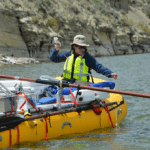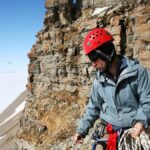Do you have an idea for a new product, service, or technology? Enjoy wearing multiple “job hats” in the workplace and learning new skills on the fly? Working in a small start-up company, or starting your own, could be a good fit for you.
Alt-Ac Careers: Entrepreneurs
Dr. Ricardo Rivera-Acevedo began his entrepreneurial journey shortly after finishing his PhD in pharmacology in 2013. Having applied to several different pharmaceutical firms and receiving no replies, he and a group of colleagues started their own company to develop cannabis as a therapeutic. After selling that company in 2018, Rivera-Acevedo joined Viridis Research as Chief Operating Officer (COO).
Viridis Research is a six-person firm seeking to commercialize a water treatment technology that removes organic materials (microplastics in particular) using an electro-oxidative reaction. Formed in December 2019, the company is presently defining its future customers’ needs and creating product, service, and manufacturing specifications to meet those needs. In his position as COO, Rivera-Acevedo works closely with the CEO to keep all parts of the business working well together, ensuring a cohesive and predictive business strategy.
Dr. Tong Li does three jobs at once: she is a Product Line Manager at Ionomr Innovations, the CEO of her own start-up, Poly V. Technology, and guest editor of an open access polymer science journal.
Ionomer Innovations designs and manufactures ion-exchange membranes for use in hydrogen fuel cells. As a Product Line Manager, Li has a very broad job description: she is responsible for all aspects of the products and processes of her firm’s green hydrogen production technologies from cradle to grave, including sales and marketing, product improvement and technical support.
While learning essential entrepreneurial skills at Ionomr, Li is taking exploratory first steps at her own fledgling start-up. Here, she is exploring potential markets for a product she developed during her PhD: an improved version of lightweight polymer (PDCPD) used in automotive manufacturing.
Dr. Daniel Mang is General Manager and Director of Sales at Planted Meals, a vegan meal prep company delivering ready-made meals to families and businesses at an affordable price. As a manager in a small start-up company, Mang wears many hats. Along with managing day-to-day operations and working to increase sales through different channels (such as grocery chains), he has also built custom equipment and programmed an integrated recipe and inventory system.
Mang’s decision to join Planted Meals, a start-up run by friends, was largely driven by his desire to balance work and family. An engineer by training, he also loves to cook. While writing his PhD dissertation, he worked at Planted Meals on weekends to clear his mind. During this time, his first son was born. Upon graduation, he began applying to jobs, but most would have required him to relocate or work long hours. Working at Planted Meals, he could stay in Vancouver close to extended family, and set his own hours, saving thousands of dollars in daycare costs. Meanwhile, he enjoys constantly leaning new things within a collegial work environment.
A polymer chemist by training, Dr. Mirjam Mai has worn many hats over her career. Following a PhD in Germany and postdoctoral research in BC, she branched out into the private sector as a Product Development Coordinator at food packaging start-up Solegear Bioplastics, later moving to pulp and paper research company Performance Biofilaments as a research scientist. Hoping to commercialize a wood fibre-based concrete additive, she then founded her own start-up; however, the market failed to materialize, and she was forced to dissolve the company.
Having experienced the ups and downs of the start-up world, Mai next began applying her knowledge in the consulting environment, first with sustainable business advisory GHG Accounting Services, then with R&D advisory firm ENTAX. Here, in her role as Senior Technology Consultant / Project Manager, she advises other start-up entrepreneurs on how to apply for scientific research and experimental development (SR&ED) tax credits.
Keep reading for advice on entrepreneurial careers
If you have entrepreneurial aspirations, these suggestions from our professionals will be helpful:
- Be prepared to learn – and do – many new things.
Start-up companies are typically very small, so most employees juggle multiple roles. Rivera-Acevedo, Li, Mang, and Mai’s job descriptions all spanned multiple job disciplines from research, to operations management, to sales, and marketing. Li highlights that there is a lot to learn, scientists need to become fluent in the languages of investors, managers, engineers, and technicians. This is a steep learning curve!
Jobs may also change. For example, Mang’s position was redefined as the company’s growth needs changed. Rivera-Acevedo and Mai moved between companies and industries, learning as they went.
- It’s okay to leave the lab behind.
After putting so much work into a PhD, many scientists worry all their work will be squandered if they pivot their careers to a different field or industry. All four of our scientists agreed that this is not the case. As Li puts it, “you don’t have to stay a chemist forever.” Instead, a PhD is an entry point to a new adventure. Mai found the transition from research to entrepreneurship and then consulting to be a refreshing change with more opportunities for advancement.
Mang stresses that the true value of a PhD is gaining the ability to understand and apply knowledge in different situations. A PhD also trains one to make thoughtful decisions, a vital skill for entrepreneurs and managers.
- Consider joining an incubator.
A business incubator is a program that provides support and mentorship for early-stage companies. Rivera-Acevedo, Li and Mai cited business incubators and their associated training as being helpful for getting their companies to the next level. For example University of British Columbia (UBC)’s entrepreneurship hub offers incubator programs for different types of businesses, including a “Lab to Launch” program for scientists seeking to commercialize hard-to-replicate technologies. Similarly, Simon Fraser University (SFU) offers several different programs and services, including their i2I (invention to innovation) program, a one-year certificate program that trains scientists how to found start-ups.
- Reach out to mentors.
Rivera-Acevedo stresses that early-stage start-ups can also benefit greatly from mentorship from seasoned entrepreneurs, who are usually thrilled to share their knowledge. As pointed out by Mai, entrepreneurism has many challenges, and it’s helpful to have someone to turn to for advice.
- Chart your own path.
Ricardo Rivera-Acevedo, Tong Li, Daniel Mang, and Mirjam Mai are four scientists who leveraged their education and entrepreneurial drive to excel in careers of their own design. The last words of advice go to Li: if you are brave and motivated, a start-up career could be right for you. Anything can happen, and you will be extremely busy. However, the return on investment is unparalleled.
About Alice Palmer
Alice Palmer, MBA, PhD is a forest industry writer and consultant based in Richmond, British Columbia. She writes about science, forestry, business strategy, politics, and whatever else piques her curiosity – or her clients’. Follow Alice’s blog Sustainable Forests, Resilient Industry here.
Alice would like to thank Ricardo Rivera-Acevedo, Tong Li, Daniel Mang, and Mirjam Mai for sharing their joys and challenges as entrepreneurs, Mirjam Mai for making additional introductions, and Canadian Science Publishing blog editor Kristin McEvoy for her editorial contribution.




